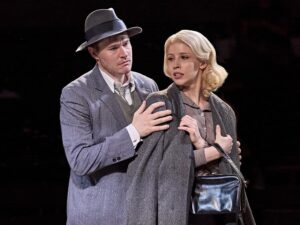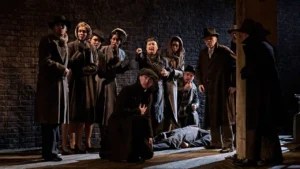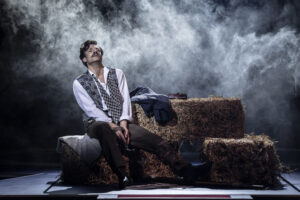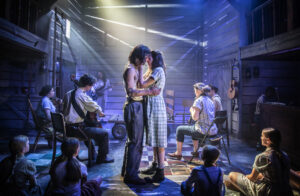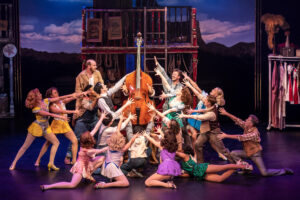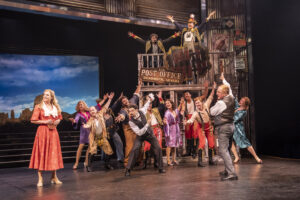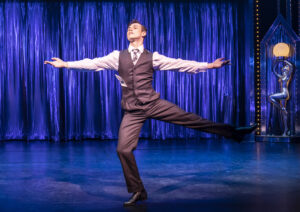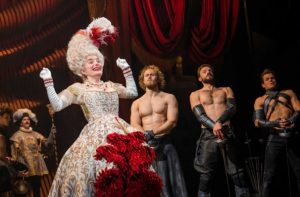Tim Minchin’s Groundhog Day musical is worth watching again and again
★★★★★

I hesitate to say this, because it’s been a few years since I saw the movie Groundhog Day, but Tim Minchin‘s stage musical version at the Old Vic in London may be funnier and deeper than the original.
The story is essentially the same. In fact Danny Rubin who wrote the film screenplay has written this musical’s book . So, once again, a cynical, egocentric TV weatherman Phil Connors is fated to repeat the same day until he redeems himself. The day in question is Groundhog Day in Punxsutawney, an annual event when a large rodent predicts the end of winter.
There is some rewriting but the added value is Tim Minchin‘s smart music. Apart from boasting some amusing lyrics, the songs add more emotional depth to the main protagonist. In addition, the character of Phil’s producer Rita is expanded to ramp up the romantic element. In fact, post ‘me too’, women generally are given a more important role in this musical version, with critical attention paid to Phil’s initially appallingly sexism.
The song Playing Nancy that opens Act Two is a case in point. Nancy, nicely played by Eve Norris, has been presented earlier as simply a shapely body that Phil lusts after. Now the woman laments: ‘I wasn’t quite aware that / I was put here to be stared at’, and asks: ‘Who am I to dream of something better?’
The aspiration to be better provides the thrust of the show. As Phil asks early on: ‘What would you do if you were stuck in one place and every day was exactly the same, and nothing that you did mattered?’ In some ways, it’s a simple idea, that it’s never too late to be a better person because each day is the first day of the rest of your life. The message may be wrapped up in glorious comedy but it is profound enough to occur in different forms in Nietsche, Aristotle and Buddhism, as the excellent theatre programme reminds us.
Andy Karl is perfect
So we see Phil go through the steps to redemption, travelling from his initial bemusement, to shock at what seems like a nightmare, to the power going to his head, to suicidal despair, to a growing understanding that the only way to be truly happy is to help others, his redemption completed when he learns humility. Andy Karl is perfect in the role. He can sing and moves well, but the joy of his performance is in his physical appearance: an expressive face that changes from handsome TV star with a fake smile to panic to glee to desperation, and he has an athletic, flexible body that can puff out, deflate, leap, and fall. Bill Murray, the star of the film, was brilliant as a curmudgeonly weatherman but the complexity Andy Kay and the musical bring to Phil Connors takes the character to a whole new level.
Possibly the most memorable scene is when Phil becomes suicidal. As happens throughout the musical, the day opens with him in bed in his small hotel room. One suicide after another sends him off stage in one direction, only for him to reappear instantly waking up in bed. It’s the sort of trick you see in a film and think little of it but done live on stage, it takes you back to when you first fell in love with the magic of theatre. Credit to Paul Kieve for this and other illusions.
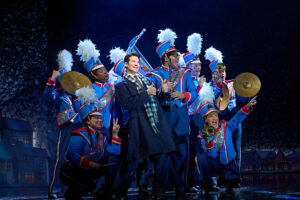
The set by Rob Howell is a wonder. Scenes of the groundhog ceremony, a diner, a street, and more, switch smoothly from one to the other while consistently returning to the centrepiece of the tiny bedroom. At one point a bar converts to a truck; and there’s also inventive use of model cars and houses to illustrate not only a car chase but a bigger view of the small town.
The nature of the story means that other characters don’t really develop but we do get to know them, and, by Phil’s actions, they do change as they too improve their lives. Take for example Debbie, played by Kamilla Fernandes, who discovers her voice and hits us with a powerful rock’n’roll song.
Tanisha Spring is terrific as Rita Hanson, a sweet, innocent woman who gradually reveals more about her insecure self and her ambitions, and provides the moral example Phil needs. The musical has a lot to say about time: we may all have felt regret at wasting it, or wishing we could have it over again to do things differently, or dreaming of the future while not living in the present. Ms Spring leads two of the best songs about this: she kicks off One Day which becomes an ensemble climax to Act One (Sample line: ‘One day, some day, my prince will come / But I won’t hold my breath / There’s only divorcees and weirdos left’), and an outstanding second act duet with Andy Karl, If I Had My Time Again which includes the line ‘I’d take the path less trodden / avoid the crap I trod in’.
As well as enjoying the wonder and the laughter again, another reason for seeing Groundhog Day repeatedly is to catch more of Tim Minchin‘s clever lyrics.
Matthew Warchus directs the whole imaginative spectacle with imagination and verve. If this production doesn’t end up with a long run in the West End (and it should), it would make a great alternative to the Old Vic’s annual Groundhog Day-like repeat of A Christmas Carol.
Groundhog Day The Musical can be seen at The Old Vic in London until 19 August 2023.
Paul was given a complimentary review ticket.
Click here to watch this review of Groundhog Day on our YouTube channel
